Welcome back to the British Genre Fiction Focus, Tor.com’s weekly column dedicated to news and new releases from the United Kingdom’s thriving speculative fiction industry.
And what a week it’s been.
Having hummed and hahed for far too long about the appropriateness of an exclamation point in the previous paragraph—given the tenor of today’s titular news—the thing to do, I thought, would be to get started already… which we’ll do with a selection of heartfelt tributes to Iain Banks, who this week told the world that he has terminal cancer.
After that, we’ll take in the contenders for this year’s Terry Pratchett Prize, portend the prospect of a Joe Abercrombie comic book, and examine—with a roving eye for candidates we might describe as fantasy or sci-fi—the hundred best books selected by a veritable superteam of teachers.
You might anticipate the usual array of new releases as well, but this week, that section is bigger and better than ever. For starters, Solaris rises again by way of an inordinately exciting anthology; at long last, The Desert of Souls gets a British edition; and later on, a Promise of Blood is made.
There’s a whole lot more to come, of course, but I’m afraid there’s only one way we can begin this installment of the column.
NEWS
An Ode to Iain Banks
Last Wednesday, we heard that Iain Banks was dying.
On his blog, Banksophilia, the author broke the news with his usual gallows humour:
I am officially Very Poorly.
After a couple of surgical procedures, I am gradually recovering from jaundice caused by a blocked bile duct, but that – it turns out – is the least of my problems.
[…]
I have cancer. It started in my gall bladder, has infected both lobes of my
liver and probably also my pancreas and some lymph nodes, plus one tumour is massed around a group of major blood vessels in the same volume, effectively ruling out any chance of surgery to remove the tumours either in the short or long term.The bottom line, now, I’m afraid, is that as a late stage gall bladder cancer patient, I’m expected to live for “several months” and it’s extremely unlikely I’ll live beyond a year. So it looks like my latest novel, The Quarry, will be my last.
As a result, I’ve withdrawn from all planned public engagements and I’ve asked my partner Adele if she will do me the honour of becoming my widow (sorry – but we find ghoulish humour helps). By the time this goes out we’ll be married and on a short honeymoon. We intend to spend however much quality time I have left seeing family and relations and visiting places that have meant a lot to us.
Ever since this personal statement was published, tributes have been rolling in. Crime writer Val McDermid spoke out about her feelings and experiences in an article entitled My Fife Friend:
There are three of us. Born within half a dozen years and a dozen miles of each other in Fife, that idiosyncratic corner of central Scotland. We each grew up with a love of storytelling, lower league Scottish football and whisky. We published our first novels within three years of each other, Iain Banks, Ian Rankin and me. With the best part of 100 novels between us, we provoke journalists to wonder whether there was something in the water.
It reads like the setup for an Iain Banks novel. And if that’s what it was, it would be the springboard for a series of intricate interlocking storylines that would draw past and present together in unexpected configurations with explosive consequences. That would be infinitely preferable to the reality of the news that Iain has terminal cancer.
I’ve known for weeks that this news was coming but that makes it no easier to look at these words on the page. When Iain leaves the stage, the lights will be dimmer, the possibilities less and the prospects more dreary. For he is one of the most playful, inventive and entertaining writers of our generation.
[…]
I can’t help raging against the dying of this light. The only good thing about knowing it’s coming is that we can all make bloody sure the man knows how much he means to us all by the time three becomes two.
Please do take that as your cue to share your most treasured memories of Iain Banks and his books.
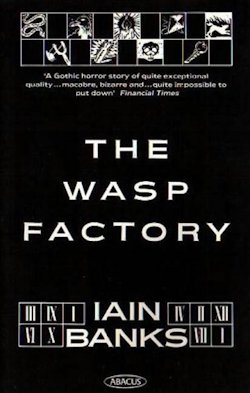
I almost met the man a few years ago, for a programme BBC Radio 4 were recording about The Wasp Factory, his phenomenal first novel. Alas, the book group it was my privilege to be a part of went our separate ways when we were told Iain Banks wouldn’t be able to make it that day.
Circumstances got in the way of my going back for a second session the week after… but oh, how I wish they hadn’t. Truth be told, truly few books have affected me in the way the horror and the humour of his debut did.
And I’m not alone in that. Very far from it, in fact. Here’s Will Hill on what The Wasp Factory meant to him and to me and to so many other readers that it’s remarkable, really:
I picked up The Wasp Factory in a bookshop in Grantham when I was visiting my grandparents one summer. I can’t remember the year, or where I’d heard about it, but I know I went into that bookshop looking for it. I remember being intrigued by the beautiful black and white covers that Abacus used to put on Banks’s novels. I remember my lovely, kind-hearted granddad (who himself died far too young, and never saw the grandson he endlessly encouraged to follow his dreams realise his biggest one, of being a published author) asking whether I was sure I wanted to read it. He wasn’t concerned about whether the content was suitable for me – he was a great believer in letting people find things out for himself. He just didn’t want me to be scared. He couldn’t help it – he was my granddad.
I assured him it would be fine.
It wasn’t.
The Wasp Factory scared the hell out of me. Not the way that the Stephen King novels I was devouring at the time scared me – this was something different. This was a tour de force, a grotesque journey through the physical and mental worlds of someone deeply broken described in prose that was alternately as blunt as a fist and as precise as a scalpel. It was my first experience of an unreliable narrator, of having the rug that I had believed comprised the entire novel pulled out from under me, and having it make perfect, tragic sense.
It was mind-blowing. It was an education in the art of what’s possible. It was an inspiration.
It was. It is. And I think it will continue to be for many, many years.
You’ll notice I haven’t yet discussed The Culture, the science fiction novels Iain Banks published with an additional initial. Well, I have an embarrassing admission to make: I’ve never read them. I’ve always planned to—I own any number of them—but before now, no pressing reason had presented itself, and there’s always something shiny and new to attend to, isn’t there?
Not this week there isn’t. Well, there is… but it can wait. Consider Phlebas can’t. Not in light of this absolutely dreadful development.
Raise a glass to one of Great Britain’s greatest writers with me, won’t you?
The Illustrated Ninefingers
A curious image appeared on Joe Abercrombie’s blog the other day.
A day later, what was merely curious become curiouser still. Then yesterday, the estimable author teased the very curiousest of all the assorted curiosities.
Here’s how the sequence of pictures progressed:
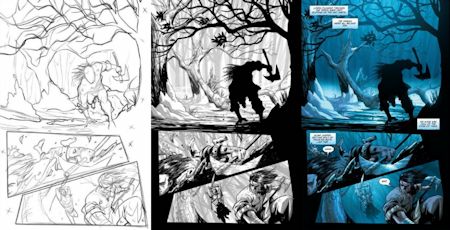
For all Abercrombie’s shenanigans, there can be only one conclusion: a comic book, of course.
The naming conventions (and the content) of the page Joe has posted in various stages suggests that we’re looking at an adaptation of The Blade Itself here… but why stop there? Why not assume that this is but the beginning of an epic sequential version of The First Law trilogy in its entirety?
I’m primarily a DC guy, by the by, but my wish is that Marvel Comics are revealed to be publishing this project. That they treat it in the same way they have their awesome adaptations of The Dark Tower and The Stand. The art certainly seems a fantastic start.
All signs point to an official announcement being made later today—assuming the news hasn’t already broken by the time this post is published. If so, what are your thoughts? If not, what would you want from a Joe Abercrombie comic book?
Personally, I can’t decide whether I’d rather Joe Abercrombie adapt it himself or focus on the prose trilogy he’s working on currently…

TES Teacher’s Favourites
Recently the Times Educational Supplement released a list of the hundred best books ever… albeit according to teachers.
I don’t have a lot of time for lists of this ilk, if I’m honest. But as an English teacher in real life, I was obscenely pleased to see how much speculative fiction figured into the thing. Here, for example, are a few highlights from the top twenty:
3. Harry Potter (series) by J.K. Rowling
6. Nineteen Eighty-Four by George Orwell
7. The Lord of the Rings (series) by J.R.R. Tolkien
9. The Hobbit by J.R.R. Tolkien
12. The Hunger Games (series) by Suzanne Collins
13. The Time Traveller’s Wife by Audrey Niffenegger
14. The Chronicles of Narnia (series) by C.S. Lewis
17. His Dark Materials (series) by Philip Pullman
18. The Gruffalo by Julia Donaldson and Axel Scheffler
20. Life of Pi by Yann Martel
Beyond these instances of fantasy, science fiction and The Gruffalo, there was plenty else for genre fans to be happy about. George R. R. Martin, Margaret Atwood, Douglas Adams, Aldous Huxley and David Mitchell all figured in.
I’d put that quite a lot of this list appears to be influenced by recent film and TV adaptations rather than the originating literature, but if that’s what it takes for speculative fiction to be embraced by the mainstream… I’ll take it.
Then again, the teachers the TES polled appear to agree that Pride and Prejudice is the best novel ever. For serious you think that book’s good, guys?
Hmm.
Anywhere But Here, Anywhen But Again

Last year, the inaugural Terry Pratchett Award for aspiring new novelists with an interest in genre fiction resulted in the publication of two books: Half Sick of Shadows by David Logan and Apocalypse Cow by Michael Logan—no relation as far as I’m aware—both of which were reasonably well received.
For everyone who delighted in those debuts, I’ve got good news: the Anywhere But Here, Anywhen But Now Prize is back. Indeed, this past week, a second shortlist was revealed. Here, then, are the nominees, hand-picked from more than 500 manuscripts:
The Unspoken Death of the Amazing Flying Boy by Jean Burdett
Bloodline by Sophie Constable
The Hive by Alexander Maskill
The Way Through the Woods by Robin Pearson
A Kill in the Morning by Graeme Shimmin
The Shadows of Annwn by Catherine Whittle
The winning entry will receive £20,000 to spend on Mars bars, perhaps, as part of an advance on a bona fide publishing contract. So the stakes are great. And I’m happy to add a small reward to the pot: I hereby swear to read and review the winner.
As Lynsey Ogg writes on Transworld’s Terry Pratchett blog, good luck to the sensational six!
Anyhow, as I said earlier, there’s a vast quantity of genre fiction slated for publication this week, so let’s do the new releases.
NEW RELEASES

Doctor Who: Shroud of Sorrow, by Tommy Donbavand (April 11, BBC Books)
A thrilling new adventure from the spectacular BBC series, starring Matt Smith and Jenna-Louise Coleman.
It is the day after John F. Kennedy’s assassination—and the faces of the dead are everywhere. PC Reg Cranfield sees his late father in the mists along Totter’s Lane. Reporter Mae Callon sees her grandmother in a coffee stain on her desk. FBI Special Agent Warren Skeet finds his long-dead partner staring back at him from raindrops on a window pane.
Then the faces begin to talk, and scream… and push through into our world.
As the alien Shroud begins to feast on the grief of a world in mourning, can the Doctor dig deep enough into his own sorrow to save mankind?
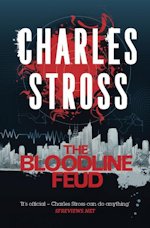
The Bloodline Feud (Merchant Princes Omnibus #1), by Charles Stross (April 11, Tor UK)
Miriam knows there’s no smoke without fire, and she’s about to get burnt.
Miriam Beckstein is a successful reporter for a hi-tech magazine. So when she discovers a huge money-laundering scam, she thinks she’s hit the big time. But when she takes it to her editor, she’s not only fired, but receives death threats. That’s just the beginning.
To distract her furious daughter, Miriam’s adopted mother unearths mementos from her real mother, murdered when she was an infant. But these reveal a secret that will ultimately throw governments into disarray. For what Miriam thinks is a simple locket has the power to fling her into an alternate timeline. In this less-developed world, knights on horseback wield automatic weapons, and world-skipping assassins lurk on the other side of our reality. Here, her true family runs a criminal empire—and they want her back.
But Miriam has other plans.
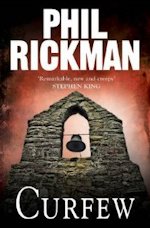
Curfew, by Phil Rickman (April 11, Corvus)
In Crybbe, only strangers walk at twilight…
For four hundred years, the curfew bell has tolled nightly from the church tower of the small country town, Crybbe’s only defence against the evil rising unbidden in its haunted streets.
Radio reporter Fay Morrison came to Crybbe because she had no choice. Millionaire music tycoon Max Goff came because there was nothing left to conquer, except the power of the spirit.
But he knew nothing of the town’s legacy of dark magic—and nobody felt like telling him.
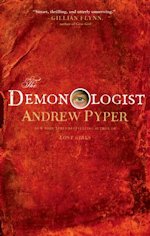
The Demonologist, by Andrew Pyper (April 11, Orion)
Professor David Ullman is among the world’s leading authorities on Christian religion and myth. Not that he’s a believer. He sees what he teaches as nothing more than entrenched fiction – the “things that go bump in the mind”. It’s why when he’s offered a trip to Venice to be a consultant on a case study based on his expertise as a “demonologist” he accepts, seeing it as a free vacation for his teenage daughter and himself.
But what he witnesses in an attic room at an address amidst the decadent splendour of the old city will change what he believes forever. Terrified, David races back to his hotel. But now he has the unshakable feeling that he is no longer alone. And that the voice that passes from his daughter’s lips before she jumps from the hotel’s roof belongs to a being he has long studied, but until now never thought could ever be real….
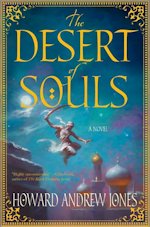
The Desert of Souls (Chronicle of Sword and Sand #1), by Andrew Howard Jones (April 11, Head of Zeus)
Baghdad, AD 790. Caliph Harun al-Rashid presides over the greatest metropolis on Earth, ruler of an empire stretches from China to Byzantium. His exploits will be recorded in Alf Layla or, as we know it, The Book of One Thousand and One Nights. But The Thousand and One Nights are silent on the deeds and adventures that befell two of the Caliph’s subjects: the renowned scholar Dabir ibn Kahlil, and his shield and right hand, Asim el Abbas. For their story, we must turn to the Chronicle of Sword and Sand…
Amid the trackless sands of ancient Arabia, two companions – a swordsman and a scholar – search for the ruins of the lost city of Ubar. Before their quest is over, they will battle necromancers and animated corpses, they will confront a creature that has traded wisdom for the souls of men since the dawn of time and they will fight to save a city’s soul.

The Good, the Bad and the Infernal, by Guy Adams (April 11, Solaris)
Every one hundred years a town appears. From a small village in the peaks of Tibet to a gathering of mud huts in the jungles of South American, it can take many forms. It exists for twenty-four hours and then vanishes once more, but for that single day it contains the greatest miracle a man could imagine: a doorway to Heaven. It is due to appear on the 21st September 1889 as a ghost town in the American Midwest.
When it does, there are many who hope to be there: traveling preacher Obeisance Hicks and his simple messiah, a brain-damaged Civil War veteran; Henry and Harmonium Jones and their freak show pack of outlaws; the Brothers of Ruth and their sponsor Lord Forset (inventor of the Forset Thunderpack and other incendiary modes of personal transport); finally, an aging gunslinger who lost his wings at the very beginning of creation and wants nothing more than to settle old scores.
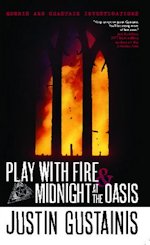
Play With Fire & Midnight at the Oasis (Morris & Chastain #4), by Justin Gustainis (April 11, Solaris)
Two thrilling new occult investigations, featuring the urban fantasy sleuths Quincy Morris, great-grandson of Dracula’s killer, and the white witch Libby Chastain.
House of worship—churches, synagogues and mosques alike—are burning across the US, usually while still full of people. The fires are initially dismissed as random acts of violence, until Morris and Chastain uncover the deadly meaning behind the destruction, and the terrifying cause the arsonists seek to serve.
Meanwhile, seeking revenge for the United States’ actions in the Middle East, a terrorist cell has conjured an afreet, a deadly djinn that will strike at the very heart of America—unless Morris and Chastain can stop it first.

Solaris Rising 2, edited by Ian Whates (April 11, Solaris)
Having re-affirmed Solaris’s proud reputation for producing high quality science fiction anthologies in the first volume, Solaris Rising 2 is the next collection in this exciting series. Featuring stories by Allan Steele, Kristine Kathryn Rusch, Kim Lakin-Smith, Paul Cornell, Eugie Foster, Nick Harkaway, Nancy Kress, Kay Kenyon, James Lovegrove, Robert Reed, Mercurio D. Rivera, Norman Spinrad, Adrian Tchaikovsky, Liz Williams, Vandana Singh, Martin Sketchley, and more.
These stories are guaranteed to surprise, thrill and delight, and maintain our mission to demonstrate why science fiction remains the most exiting, varied and inspiring of all fiction genres. In Solaris Rising we showed both the quality and variety that modern SF can produce. In Solaris Rising 2, we’ll be taking that much, much further.
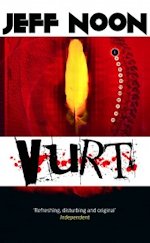
Vurt, by Jeff Noon (April 11, Tor UK)
Take a trip in a stranger’s head. Travel rain-shot streets with a gang of hip malcontents, hooked on the most powerful drug you can imagine. Yet Vurt feathers are not for the weak. As the mysterious Game Cat says, ‘Be careful, be very careful.’
But Scribble isn’t listening. He has to find his lost love. His journey is a mission to find Curious Yellow, the ultimate, perhaps even mythical Vurt feather. As the most powerful narcotic of all, Scribble must be prepared to leave his current reality behind.
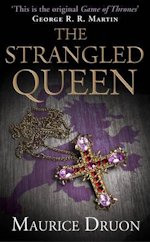
The Strangled Queen (Accursed Kings #2), by Maurice Druon (April 11, Harper Voyager)
The King is dead. Long live the King.
Philip IV is dead and his great kingdom is in disarray. It seems the fatal curse of the Templars is plaguing the royal house of France.
His son has been enthroned as Louis X; but with his disgraced wife Marguerite imprisoned in the Chateau Gaillard for her adultery, Louis can produce no heir with which to secure the succession. But neither can he marry again while she lives…
The web of scandal, murder and intrigue that once wove itself around the court of the Iron King continues to draw in his descendants, as the destruction of his dynasty continues apace.
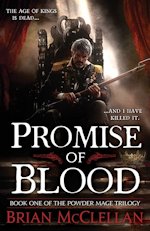
Promise of Blood (Powder Mage Trilogy #1), by Brian McClellan (April 16, Orbit)
’The Age of Kings is dead. And I have killed it.’
Field Marshal Tamas’s coup against his king sends corrupt aristocrats to the guillotine and brings bread to the starving. But it also provokes war in the Nine Nations, internal attacks by royalist fanatics and greedy scrambling for money and power by Tamas’s supposed allies: the Church, workers’ unions and mercenary forces.
Stretched to his limit, Tamas relies heavily on his few remaining powder mages, including the embittered Taniel, a brilliant marksman who also happens to be Tamas’s estranged son, and Adamat, a retired police inspector whose loyalty will be tested to its limit.
Now, amid the chaos, a whispered rumour is spreading. A rumour about omens of death and destruction. Just old peasant legends about the gods returning to walk the earth. No modern educated man believes that sort of thing… but perhaps they should.
POSTSCRIPT
There are so many exciting genre novels to look forward to this week that I already feel guilty about my decision to read Consider Phlebas instead, but that’s my plan and I’m sticking with it. If I can resist continuing this long-overdue look at the canon of Iain M. Banks, I’m entirely likely to spend several nights with another classic: namely Vurt by Jeff Noon, which Tor are republishing in the UK this week with a new introduction by Lauren Beukes.
That said, The Good, the Bad and the Infernal looks like fantastic fun, Promise of Blood sounds particularly promising, and the second Solaris Rising anthology is apt to be stellar as well.
So much genre fiction, so little time!
What an absurdly happy problem to have. But what an absolutely bleak week to suffer this embarrassment of literary riches.
There may be more coming from the British Genre Fiction Focus fold sooner than you think, but beyond that, how about we meet again next week? Right here, alright?
Niall Alexander is an erstwhile English teacher who reads and writes about all things weird and wonderful for The Speculative Scotsman, Strange Horizons, and Tor.com, where he contributes a weekly column concerned with news and new releases in the UK called the British Genre Fiction Focus, and co-curates the Short Fiction Spotlight. On rare occasion he’s been seen to tweet about books, too.










